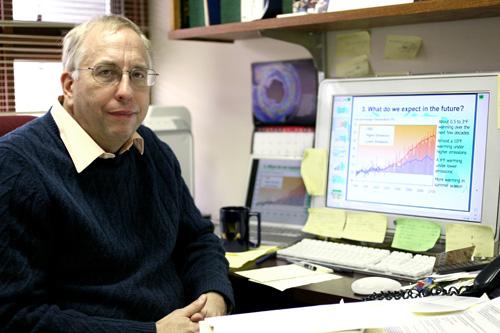UI professor does notable research on climate change

Don Wuebbles, professor of atmospheric sciences, recently finished assessing the potential impact of climate change on the city of Chicago. Erica Magda
Feb 11, 2008
Last updated on May 12, 2016 at 09:18 p.m.
Some children want to be firefighters or astronauts when they grow up, but Don Wuebbles, professor of atmospheric sciences and interim director of the School of Earth, Society and Environment, said he has wanted to be a scientist since he was a child. Even as an adult, he refers to his job as playing.
“I play in the sandbox of science,” Wuebbles said. “It’s a great joy to do what I’ve done.”
Wuebbles received his bachelor’s and master’s degrees in electrical engineering at the University and his Ph.D. in atmospheric sciences from the University of California, Davis.
He has written nearly 400 scientific articles related to atmospheric science and his accomplishments include developing one of the first air quality models.
Get The Daily Illini in your inbox!
“He’s a person with good vision, and he’s very passionate about what he does,” said Praveen Kumar, professor in civil and environmental engineering. “I’m amazed at how he finds time for all he’s involved in.”
Wuebbles and Kumar created the Institute for Sustainability of Intensively Managed Landscape together, with Kumar as the coordinator and Wuebbles as the director.
“It’s mostly research related to sustainability,” Kumar said. “We’re focused on the Midwest region dealing with water quantity and quality.”
Their research is funded by the University, the National Science Foundation and NASA.
Among Wuebbles’ many honors and awards includes sharing in the Nobel Peace Prize for his work with the United Nations Intergovernmental Panel on Climate Change.
These reports were used by Al Gore for his movie, “An Inconvenient Truth,” which won Gore the Nobel Peace Prize in 2007.
“I got a very nice pin and letter from the United Nations thanking us for the work we did,” Wuebbles said.
Don Wuebbles, along with three other faculty members and four department research scientists from the University, contributed to these reports as well.
“Don has made exceptional contributions to understanding the depletion of the ozone and the stratosphere and what causes it,” said Bob Rauber, professor and head of the atmospheric science department.
Wuebbles has also done many assessments finding potential climate effects.
“I have a project with the (Environmental Protection Agency) that’s looking at the potential impacts of air quality change in the U.S.,” Wuebbles said. “It will probably be used by the next administration.”
He was also recently asked to do an assessment in Cyprus, an island country in the Mediterranean.
“Many of the assessments have been pro bono, but I have a whole team of researchers and I can’t fund that all by myself,” Wuebbles said. “The U.S. assessment was pro bono as well.”
Most recently Wuebbles is working on local climate assessments, putting into perspective how global changes can affect a particular region, Rauber said.
His most recently completed assessment was done for Chicago’s Mayor Daley about how climate may affect the city.
“I completed the assessment in October,” Wuebbles said. “Reports will probably be released in early March.”
Some information from the assessment of climate change in Chicago states that if emissions continue to increase, precipitation could increase 20 percent over the next century.
The number of hot days with temperatures higher than 100 degrees Fahrenheit is also likely to increase and the levels of Lake Michigan could decrease as low as 1.5 feet over the next century.
“There’s been no period like the period we’re having now,” Wuebbles said. “There’s lots of evidence climate change has been human driven. We need to get serious about it or we’re going to have impacts happen that we won’t be able to respond to.”
Another of Wuebbles’ many current projects is working on how aircraft affect the stratosphere.
“He’s been working with airlines and the EPA,” Rauber said. “We need to see if (airplane emissions) have an effect on climate change.”
He has also been a major proponent of creating a new school in LAS, the School of Earth, Society and Environment and a major within it, Earth System Environment and Society, Rauber said.
One of the school’s goals is to raise campus awareness of environmental issues, he added.
Even with Wuebbles’ busy schedule, he still has time to be a dedicated professor.
“If a student needs his time, he’ll always take the time to meet with them, despite his busy schedule,” Rauber said. “He’s really a class act.”





